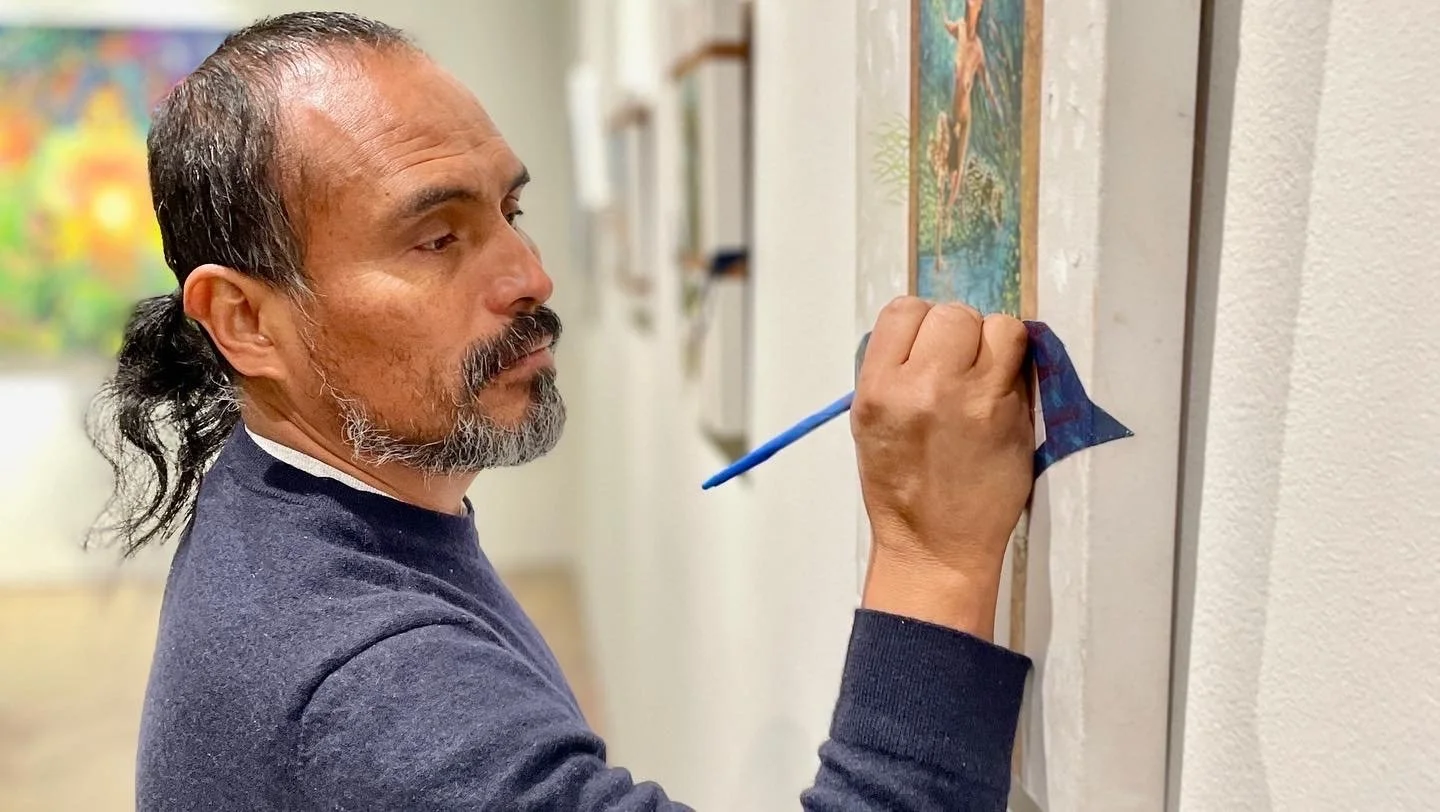Juan Chawuk: Iridiscencia Cultural
La percepción de la cultura de Chiapas se transforma con las interpretaciones. Ahí surge la iridiscencia (Reflejo de colores distintos, generalmente como los del arco iris)creativa que captan mis sentidos y que se manifiesta a través de estas obras.
En esta muestra de tres series, hago referencia a esas interacciones en el tiempo que muestran a Chiapas como hogar de varias culturas milenarias en gran agitación global, con una identidad en constante conflicto que se expresa en nuevas maneras de crear.
La serie de fotografías es una muestra clara de una combinación de filosofías y creencias religiosas; la interpretación de las imágenes impuestas por una cultura externa con lo local, el pasado remoto de una cultura milenaria, pero que en la actualidad tienen interlocución y genera los prismas que reflejan colores emocionales y formas que sorprenden a la vida diaria.
Esta serie de fotos se hizo reflexionando sobre las emociones que provoca las fusiones de iconografías.
La serie de obras pequeñas es más mítica y su toque de realismo mágico identifica a Latinoamérica con los procesos creativos, desde modelos en vivo hasta animales de la selva. Sus pinceladas recuerdan las energías de la naturaleza que se mezclan con las magníficas obras artesanales de la región Chiapaneca.
Asimismo, la serie de piezas de barro y fibras de la selva que antes utilizaban los lacandones para túnicas, juega con las estampas de los textiles sin ser tan obvias pero pretende llevar al espectador a rememorar un Chiapas que, si ya lo conoce, se transforma en experiencia que revive. Y si aún no lo conoce, transporta al espectador a Chiapas y sus textiles en un contexto contemporáneo, fantástico y creativo que invita a una experiencia de vida con estas culturas y su naturaleza.
Que esta muestra sea una manera de conocer una parte de México que se identifica con lo global contemporáneo pero con una raíz muy valiosa de su pasado milenario.
English Translation:
Juan Chawuk invites viewers to experience his home state of Chiapas, Mexico through paintings, photography, sculptures and murals. As part of an ongoing series, this work shines light on the multicultural citizens of Chiapas, how they’ve coexisted for centuries, and how conflict there has fostered new ways of creating.
As an indigenous Maya Tojobal artist, Chawuk’s photographs show how cultures fuse together a shared iconography including some imposed by outside cultures with what remains from traditions of the past — including from the land’s ancient cultures. These icons generate dialogue and reflect emotional colors and shapes, leading to surprises. The series of small paintings are more mythical with a touch of the magical realism often linked with Latin American art and literature. Featuring live models and jungle animals, the paintings’ brushstrokes suggest the magnificent handicrafts of the Chiapas region. And the sculpture is made of mud and fibers from the jungle that the Lacandones people once used for tunics. This piece encourages viewers to experience the Chiapas cultures and their nature.
Chawuk’s interpretations transform perceptions of Chiapas and allow viewers to experience the creative iridescence (a reflection of various colors, similar to a rainbow) that his senses capture in these works.
The exhibit is a partnership with Arte Mexicano en Indiana and curated by its founder, Eduardo Luna. Luna is a social practice artist, cultural promoter and advocate for Mexican identity and Latina/o/x culture. Luna hails from the state of Guerrero, the city of Acapulco, in the Costa Chica region of southern Pacific Mexico. Since 2012, he has been curating events featuring artists of Mexican and Latina/o/x heritage for diverse Indiana audiences. Eduardo is a co-founder of Nopal Cultural, La Sardina Gallery, and Radio Calaca (formerly Espanglish Night), and has served for many years as Big Car staff artist. Arte Mexicano en Indiana was founded in 2020, with a mission to encourage and promote Mexican art, music, and culture in Indiana through collaborations and by organizing and promoting public events. “Our vision is that people of Mexican heritage develop pride in their cultural heritage, and that native Hoosiers develop a richer perspective on the Mexican people and the culture we contribute to Indiana,” says Eduardo. He is a member of the international Mexican Cultural Art Alliance (MCAA), a group of Mexican and Mexican-American arts administrators started by Carlos Tortolero, founder of the National Museum of Mexican Art.
Made possible by Arte Mexicano en Indiana, The Arts Council of Indianapolis, The City of Indianapolis and The Andy Warhol Foundation for the Visual Arts.


